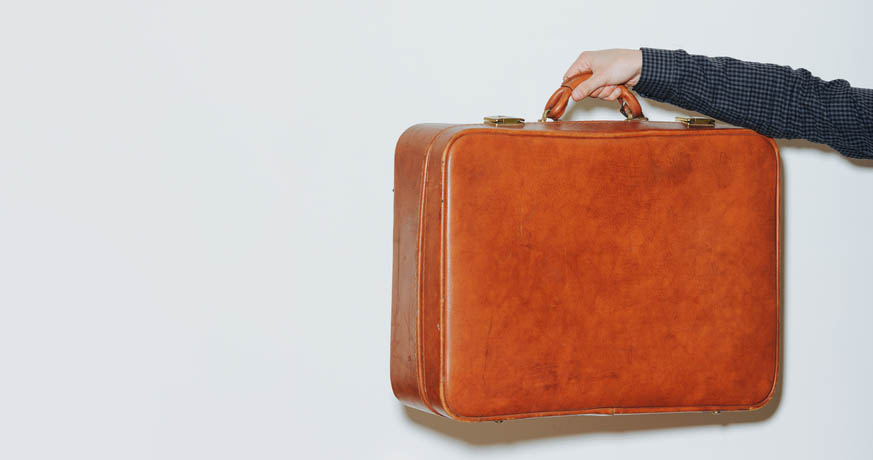25 Oct Losing Your Baggage

I bet that if I said, “Let’s start the process of dealing with your psychological baggage,” most people would tense up a bit and expect that they’re in for a “heavy” experience. It’s funny, because if we’re carrying around this baggage all the time, it already represents a certain “weight” that we’ve gotten used to, and the “dealing with it” part should amount to feeling lighter and freer.
While writing our book, The Well Life, we felt it simply wasn’t possible to guide people to the wellest of lives without encouraging them to resolve and/or release the stuff from the past that may be undermining their best efforts to be healthy and successful today. But we anticipated that some readers might react to this agenda about as well as if we offered to give them an amateur root canal.
I don’t have enough space in an article to explain our whole methodology – not to mention the approaches we use before and after to prepare for and stabilize this work. But I’d like to share an except on how we introduce this process, which I hope will help you feel ready to liberate yourself:
“Now, before you think, “Oh boy, this is going to be heavy,” we want to tell you that this doesn’t have to be a heavy experience. In fact, it’s an opportunity to feel lighter. It’s just that, between the heaviness and the lightness, there’s often something that one of our former teachers calls a “veil of discomfort.” The discomfort is only a veil because it’s really quite insubstantial. As soon as we become willing to experience it, we readily pass through it. And on the other side is lightness and opportunity!
Let’s talk about how these loose ends from your past can undermine you. One thing that may happen when you prepare to go for something big (whether it be a new relationship, a career change, or a cross-country move) is that your mind quickly runs through all your baggage—unresolved issues, past traumas, mistakes, losses—and tells you this is a bad idea.
Rather than hating your mind for this, it’s important to remember that you programmed this mind. You started out as a baby with a clean mental slate, and little by little you trained your mind to look out for things that might threaten your survival or happiness. That’s how your mind is built to work. It just happens that most minds are overly eager to do this job (especially if it means that your mind gets to monopolize your attention).
The more intense the bad experiences of your past, the deeper the groove they cut in your mental record. The mind looks for anything in your present that even remotely resembles these past experiences so that it can steer you clear from repeating them. It produces warning thoughts and initiates intense emotions to grab your attention.
So what can you do? Thank your mind for its efforts to protect you, but inform it that it’s working from outdated beliefs and overly generalized data. There’s no purpose in blaming yourself for how your mind functions. You’ve done your best with the resources that were available to you in each moment. But if you want the freedom to show up to each moment without being restrained by your past, it’s imperative to recognize that your baggage impedes this. Limiting beliefs and the echoes of past emotions are an intrusion on your space and the peace that lies within.
The key to identifying past incidents that get priority cleanup status is that when you bring them to mind and then check in with your body, you don’t feel altogether light and clean. Instead, you might feel heavy, tight, agitated, or constricted. Or a negative emotion might come up, such as guilt, fear, shame, anger, regret, sadness, or grief.
It’s possible that something you did that was objectively bad, like stealing the Statue of Liberty and burying it in your backyard, doesn’t actually provoke an especially strong physical or emotional response when you focus on it. In such cases, it’s important to remember that the objective “sin rating” of an event is less significant than how much of a hook it has in you. On the other hand, you might have accidentally thrown away your child’s first finger-painting and experience a tremendous feeling of guilt when you think about it—this would be something worth addressing.
Think of this process like cleaning your living space. When your house is filthy, there are piles of documents, dishes, laundry, and areas needing repair. It can feel so daunting you don’t know where to begin. You don’t even want to begin. But once you start, and then you have one room that’s clutter-free, it feels more manageable. Eventually, the whole house is pretty well in order, and then it’s fairly easy to stay on top of it. In the same way, as you clean up your life, you’ll find it both easier and more appealing to continue to clean, and to nip any new messes in the bud so they don’t impede your future.”
If this sounds good to you, I encourage you to let go of something right now. If you feel into your body, are you totally at ease? If not, is the unease associated with something that’s unresolved? Something you want to be different? Something you’re holding onto? Why not let it go – even if just for this moment? First try feeling it without any resistance, welcoming the feeling completely. Then take a breath into the feeling and as you exhale, let it go.
If you’re intrigued by where we’re headed, check out our book.
Be well,
Dr. Peter Borten




No Comments